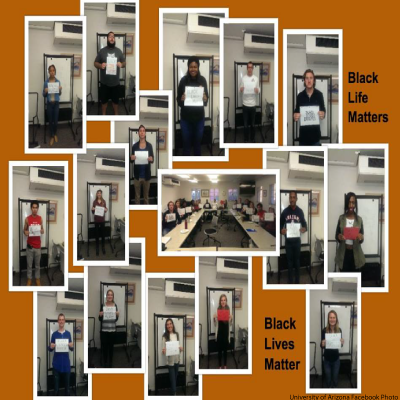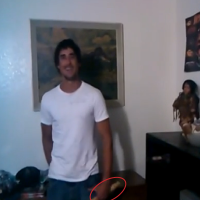

The Black Life Matters Conference is scheduled for January 15-17, at the University of Arizona in the Dunbar Center. Discussion will focus on “WHY Black life matters and WHAT can be done about sustained racialized state violence.”
The Black Lives Matter movement began in response to the shooting of Michael Brown by a police officer in Ferguson Missouri, after Brown had stolen cigars and roughed up a clerk at a convenience store.
Organizers say a “Facebook conversation about Jordan Davis and the white space of white silence led to a brainstorm one morning in early 2014, which led to a lengthy email conversation among editors at The Feminist Wire, which led to our collective intention to host a conference at the University of Arizona.”
According to the conference website, the event will include the following lecturers:
• “Ian Ellasante is a transgender poet and artist of African, Choctaw, and European descent. Originally from Memphis, Ian studied Creative Writing and Sociology at the University of Memphis before moving to Tucson in 2007. He recently completed his M.A. at the University of Arizona, which culminated in a creative thesis of his poetry and an expository introduction entitled “Bridges Between Me: Liminality, Authenticity, and Re/integration in American Indian Literature.”
• “Hakima Abbas has been active in struggles for social justice for nearly two decades. As a researcher she has focused on strengthening and supporting movements for change in Africa. Hakima is a member of the Jang! collective that provides popular education tools, platforms, and accompaniment to activists working for radical transformation. She is the editor and author of various publications, is on the editorial collective of The Feminist Wire, and is a contributor to Al Jazeera online. She is currently Director of Programs at AWID and serves as a board member to Greenpeace Africa, the Rosa Luxemburg Foundation Eastern Africa and the African Sex Workers Alliance.”
• “Deborah L. Embry is President and CEO of the Tucson Urban League, Inc. As President and CEO, she overseas the TUL’s programmatic direction. Prior to joining TUL, Ms. Embry served as Director of the Mayor’s Office of Strategic Partnerships/Grant Facilitator at the City of Racine”
• “Christopher Arlen, a self-actualized gay man, is an adroit facilitator, activist, conflict resolutionist, and community advocate. He has worked with diverse communities in Tucson, several California cities, and Denver for the past 20 years. Arlen is the principal consultant and mediator for Christopher Arlen Nonprofit Consulting, Inc., as well as Arlen Dispute Resolution Services. He currently lives in Denver with his husband, Damon, and their dog Oliver.”
• “Monica J. Casper is Department Head and Professor of Gender and Women’s Studies and affiliated faculty in the Africana Studies Program and the School of Sociology at the University of Arizona. She researches and writes about gender, race, health, bodies, sexuality, motherhood, reproductive politics, trauma, and disability.”
• “Charles H.F. Davis III is Director of Higher Education Research and Initiatives at the University of Pennsylvania Center for the Study of Race and Equity in Education. He is also a doctoral candidate at the Center for the Study of Higher Education at the University of Arizona, where his research examines the use of digital media in contemporary student activism and social justice organizing.”

According to organizers, “Planned outcomes of the conference include a series of thematic policy papers as well as local, regional, and national action items and a ‘to do’ list of next steps. We envision this conference as part of an ongoing conversation about Black lives, and not as a beginning, an end, or the ‘last word.’ It is our hope and intention that participants bring with them the vital work they are already doing, and carry away tools and resources to continue to do that work in their own communities.”
No action was taken last year by anyone in the social justice movement at the University of Arizona when Tucson Police shot and killed a hard-of-hearing man. That man, Michael Dunklee was sleeping in an apartment from which his friends had been recently evicted. Police said that he woke up when they entered the darkened bedroom and was wielding a small stick when they shot him.
Protests did not follow the attack by a Tucson Police officer of a University of Arizona coed during a rowdy night of partying after the University’s basketball team in the March Madness tournament. The video of the officer clocking the coed and her hard landing as she fell backwards over a bench went viral.
Mann helmet cam
